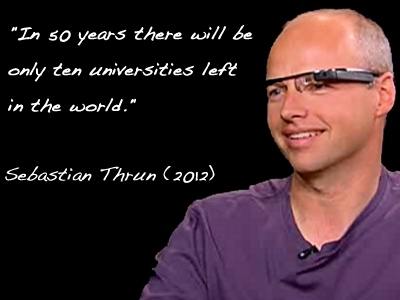A Perspective On Writing MOOCs For Income vs. Developing Curricula As An Employed Academic
I had reached a point in my career were I was tired of teaching the same courses, being forced to use technology that didn’t facilitate learning and being asked to publish when I’m not lecturing 15-20 hours a week. On top of that, I was waking up at 4am to work on my PhD, which is a part-time job in itself. What really bothered me was that my doctorate was in educational technology, but the usual academic bureaucracy was not interested in any initiatives from the bottom. Instead of being bitter, I let the cliché’s run constantly through my head, “everything happens for a reason”, “what doesn’t kill you makes your stronger”, “when one door closes, another door opens”.
Only this time, no doors opened. I had spent three years and $30,000 on my PhD and was ready to work in the field of educational technology, specifically MOOCs. The truth was, I wasn’t qualified. I was not getting any bites on my CV and I understood. No one needs a PhD to design a MOOC. I had the research skills but no the practical skills. If you look at a MOOC or similar jobs in elearning, you’ll notice a specific skill set that really only comes from experience. Most require a certain level of mastery in a particular software or technology such as Adobe Captivate, Articulate Storyline, LMSs or apps.
As I contemplated ways to gain experience and earn income, I realized that the only way I could gain the necessary practical skills was to start my own company and design MOOCs based on my expertise and others. Four months running later, I own Expert MOOC. There have been many exciting challenges with starting a business and transitioning from academia to entrepreneurship, but one of my biggest challenges is designing a course without the strict guidelines and cushion of a higher education provider.
- The first problem was originality.
I already used my expertise to design courses for other institutions. Realistically, it was good work because the courses were approved and the school’s kept their accreditation. How do I create new content on the same subject without plagiarism? - The second problem was not thinking like an academic.
I quickly found that Udemy learners are looking for an engaging course that will let them immediately apply what they’ve learned – not when their internship starts or when they graduate four years later. - They are not traditional college students.
They decide which courses to take and when to take them. They have at least three options of the same course (some have over forty) offered by different instructors and varying prices. There are other influencers such as course size, reviews, course image and a promo video. We say that college students are consumers, but this is on another level. - Digital literacy is not an option.
As an academic, I could embrace introduced technology or I could pretend to use it in my classroom. We all know educators play a large role in failed technology programs. In this situation, I had to learn and master several technologies if I ever wanted to produce a profitable course. - I miss IT.
Can you imagine saying that? I miss the grumpy IT guy that would fix my computer or solve menial problems in less than a days work. When something goes wrong or when I cannot grasp a new tool, it requires hours of research, a few calls with the support team and a glass of wine.
While I appreciate and value my studies (I did not finish my PhD), I learned more about educational technology in the past four months than I did in my research. The main reason is because I had to learn and apply many things and quickly. Also, if I went back to higher education, I would approach technology differently. I learned that developing digital literacy skills is more important than the latest technology. Designing a course to earn income and without the restriction of accreditation bodies has been rewarding. You are constantly challenged because there is no person or organization restricting your ideas. There is a sense of freedom in creating your own learning objectives and relying more on your expertise.









